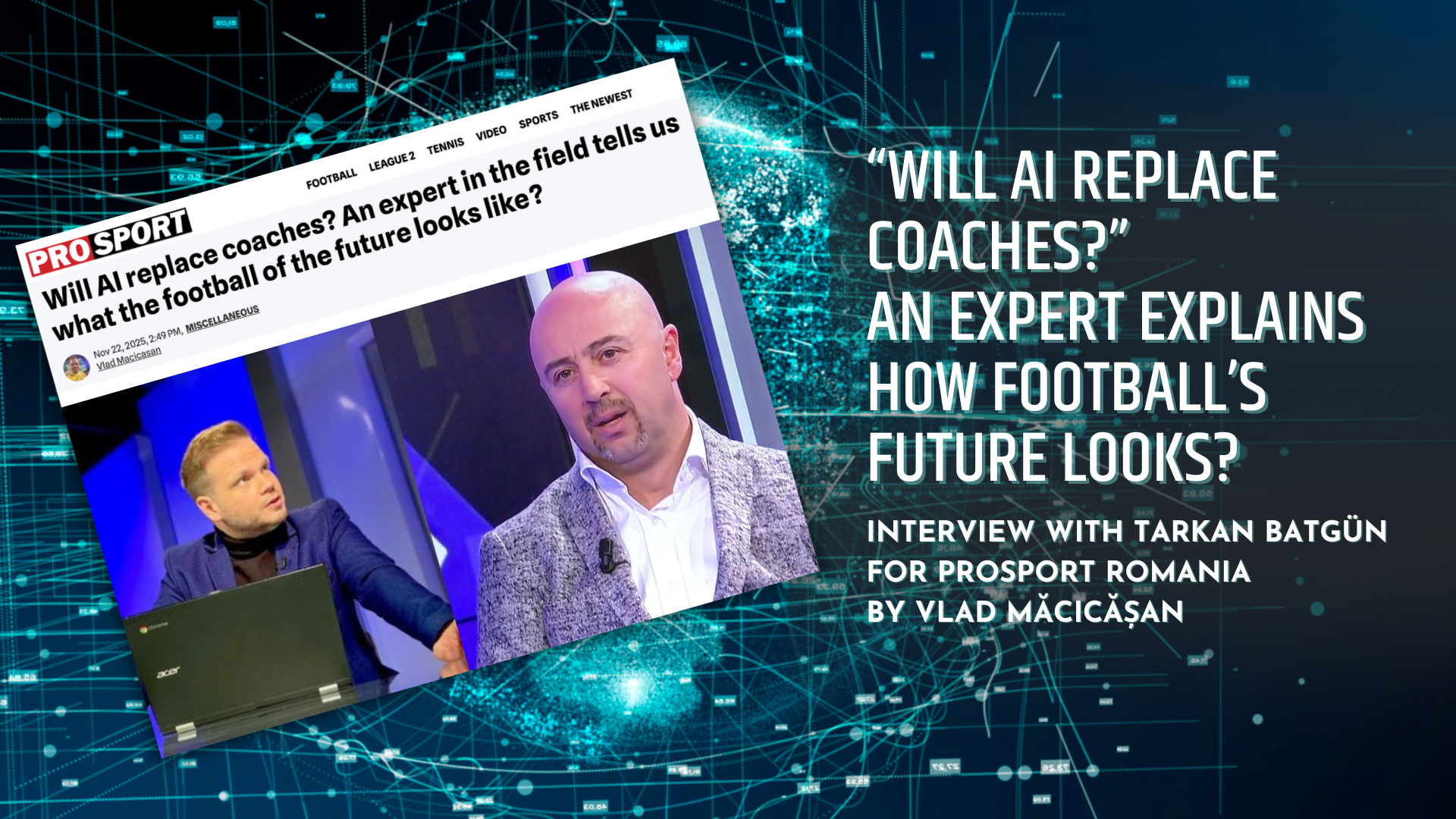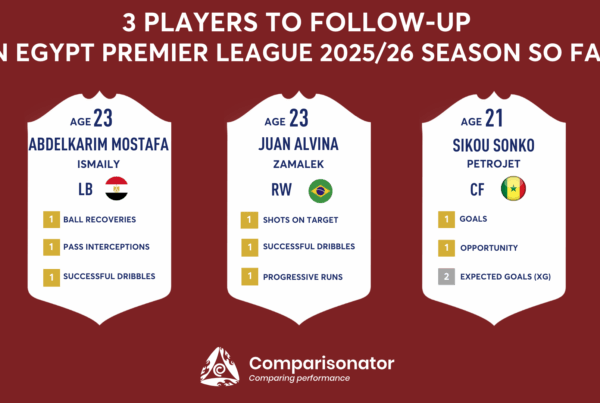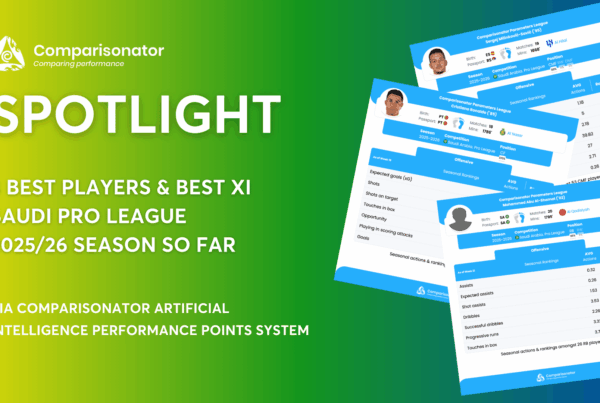Interview with Tarkan Batgün for ProSport Romania by Vlad Măcicășan
“Will AI replace coaches?” — An expert explains how football’s future looks?
Interview with Comparisonator CEO Tarkan Batgün for ProSport Romania, thanks to Vlad Măcicășan
In a world undergoing major transformation, every field is trying to adapt. As Artificial Intelligence sparks a revolution and enters everyone’s lives, we asked: how will AI shape the future of football?
We spoke with Tarkan Batgün — CEO of Comparisonator, a platform used by professional football clubs for analysis and scouting. The Turkish expert on player monitoring explains how the future of football will look and how strongly AI will influence it. He answers whether AI will replace coaches or scouts.
“You don’t fix problems after they appear — you prevent them before they exist.”
Tarkan, how is AI changing the world of football?
“AI didn’t come to replace football. It came to help us understand it better. Before artificial intelligence found its place, clubs needed weeks — sometimes months — to build a complete picture of a player. Scouts travelled to distant stadiums, analysts dug through endless hours of footage, departments debated subjective impressions until late at night. Today, AI can analyse thousands of minutes of football in seconds. It compresses weeks of observation into a single moment of clarity. But the true change isn’t volume — it’s perspective. AI reveals invisible patterns to the naked eye: how a player behaves under pressure, how consistently he fulfils his role, whether the current league inflates or suppresses his numbers, whether his habits translate into a new tactical system. But football remains a human story. The emotion stays, the passion stays. What changes is the clarity with which we see the truth. The result isn’t a sport taken over by “robots,” but one better protected from human errors.”
What changed in match analysis?
For decades, match analysis was based on counting: shots, passes, crosses, possession. But counting doesn’t mean understanding. Knowing what happened doesn’t tell you why it happened. AI moved the whole methodology. Where traditional analysis isolated events, AI embeds them into a continuous tactical narrative. It can pinpoint exactly when a defensive line loses its shape, when a pressing scheme fails, when a midfielder’s intensity falls below functional threshold. You see behaviours, not just actions.

This revolution is powerful for coaches. Instead of static reports, they now get conceptual insights. For example: when your striker’s pressing drops after minute 70; when your right-back receives the ball too deep to launch vertical play; when opponents repeatedly attack the same zone because of a structural imbalance. Observations like these transform training from reactive to proactive. You don’t fix problems after they emerge — you prevent them before they do.
About live match support: can AI influence coach decisions during the game?
“Nobody can process twenty graphs in the 63rd minute. But everyone can understand a single sentence. The real power of AI in real-time analysis does not lie in complexity, but in its ability to reduce complexity. AI can detect a drop in duel success in a certain zone or a collapse in pressing due to fatigue — long before the coach notices. But information must come as a single message, like ‘your left midfielder has stopped doing defensive work’ or ‘the opponent builds constantly in zone 14’. These internal details can trigger immediate tactical changes. But AI supports decisions — it doesn’t make them. Intuition remains essential.”
“Clubs now use AI not as a toy, but as a strategic tool.”
Could AI lead a football team today?
(smiles) “No. And frankly, it shouldn’t. Football isn’t just a game of statistical patterns. It’s a human ecosystem built on emotion, leadership and unpredictable chemistry. AI can recognise trends, analyse patterns, simulate scenarios, even identify tactical problems before the opponent notices. But it can’t feel fear, adrenaline, pressure, or the decisive moment. It can’t walk into a locker room and change the atmosphere. The job of a manager is much more than moving pieces on a tactical board. It’s about understanding personalities, building trust, calming egos or lifting morale. AI doesn’t understand the look in a striker’s eyes when he’s losing confidence. It doesn’t sense when a young player needs encouragement instead of criticism. These moments define careers. AI is the assistant who never sleeps, never forgets, never loses concentration — but leadership belongs to people. Let’s leave to AI what it does best: analyse. And let humans do what they know best: lead. Football survives because emotion survives.”
How many football clubs use Comparisonator platform?
“Comparisonator operates in over 45 countries, working with clubs from the Premier League, Bundesliga, La Liga, MLS, Türkiye, Portugal, Scotland, Brazil, South America, Middle East and more. We collaborate both with huge clubs fighting for Champions League spots and ambitious clubs from developing leagues trying to close the gap. What’s fascinating is how different their questions are — in England they want to know if a player can handle the intensity; in South America they ask if he can adapt to Europe’s tactical demands; in Asia they check if a European player can endure the climate and travel schedule; in Türkiye they ask about consistency under pressure. Each club speaks a different football language. Football is universal, but each club’s questions are deeply local.”

How much have club demands changed in recent years?
“Clubs no longer want numbers — they want wisdom. The evolution of clubs’ demands has been dramatic. Ten-twelve years ago, clubs primarily asked for raw statistics: passes, duels, shots, recoveries. But numbers without interpretation are just noise. A midfielder playing 90 passes in a league with weak pressing and another making 40 passes in the Premier League — they don’t live in the same universe. Today, clubs expect from AI something much more valuable: contextual football intelligence. They ask deeper questions: ‘Will this player fit our coach’s tactical principles?’; ‘Does he know when to trigger pressing?’; ‘How will he perform in a league that is 20% faster?’; ‘What will his development look like in the next three years?’; ‘Will this be a safe investment or a risky bet?’ Clubs have become far more financially disciplined. They don’t want a report, they want a decision. The change is cultural. Clubs now use AI not as a toy, but as a strategic instrument that protects budgets, shortens scouting cycles and supports long-term planning. We have moved from data collection to football intelligence. That is the new era.” “A great coach can still succeed without AI — but he will always be reactive. AI-supported coaches anticipate.”
Is it still possible to coach a top-level team without AI?
“It’s still possible. Many great coaches have built their careers that way. But modern football is too fast for the human eye to catch everything. Tempo has increased dramatically over the last decade. Transitions are faster, pressing more coordinated, defensive lines move more aggressively, player loads are monitored precisely. No staff, no matter how talented, can manually analyze the volume of information modern football generates. AI acts as a second layer of vision — revealing details that would otherwise remain hidden. AI gives the coach an early warning system. You no longer wait to concede a goal — you see the danger before it appears. A great coach can still succeed without AI, but he will always be in reaction, while AI-supported coaches anticipate. In elite football, anticipation means everything.”
What is the relationship between scouting and AI?
“The future of scouting isn’t AI replacing scouts. It’s AI and scouts working as two complementary brains. No scouting team can monitor every league, every country, every second-tier league, every youth competition. But AI can filter millions of minutes and show you which profiles are worth investigating. AI identifies players who fit tactical, physical or stylistic criteria. Scouts then bring what AI can’t: the human truth. Personality, hunger, professionalism, emotional stability — these are invisible to AI. I’ve seen many players succeed statistically, but fail mentally. Cracks that no database can detect: being late to training, difficulties adapting abroad, bad habits, emotional fragility, conflicts with teammates, inability to adapt socially. AI reveals possibilities. Scouts reveal realities. When both agree — that’s when you have certainty.”

“Ten years ago, Türkiye was exactly where Romania is now.”
Are Romanian clubs adapted to modern football technology when it comes to scouting?
“Romanian clubs are not behind — they are in transformation. Every league has its own rhythm. Ten years ago, Türkiye was exactly at the stage where Romania is now. The same applied to Scotland, Belgium. Some Romanian clubs already use analysis tools; others are building early infrastructure. This natural transition happens everywhere. Academies are strong, players are competitive, coaches are passionate. Technology is just the structural upgrade aligning Romania with global football. When a country with a football tradition adopts modern tools, it accelerates quickly.”
If you were a club president — would you use AI exclusively for transfers?
“AI would guide me — but would never decide instead of me. I’d use AI like a compass. Something that shows me where the truth could be, but not something that chooses for me. A club’s identity isn’t mathematics — it’s cultural. Transfers affect the locker room, supporters’ culture, tactical evolution of the club. A model can’t feel those things. AI can tell you which player fits the model. Only humans can tell you which player fits the club.”




